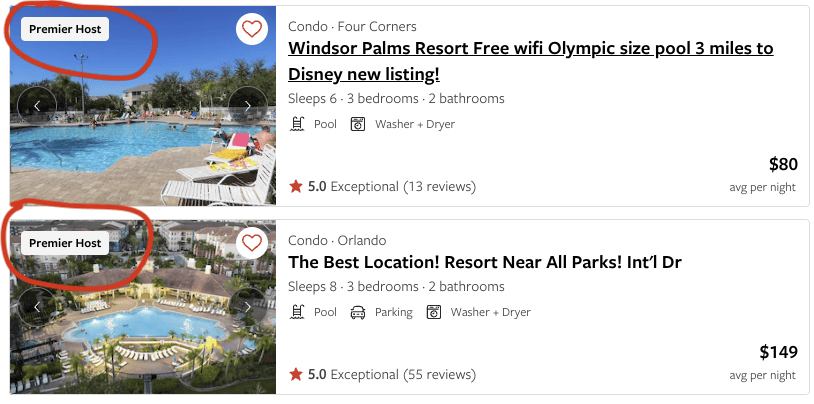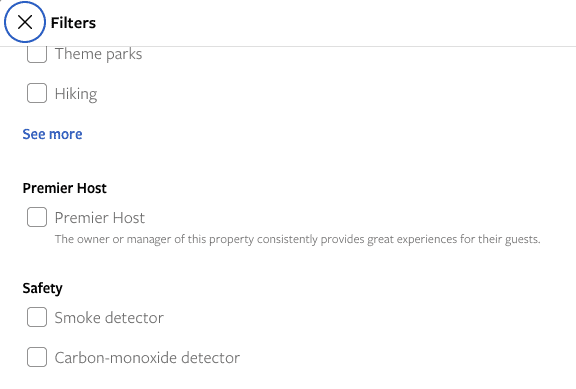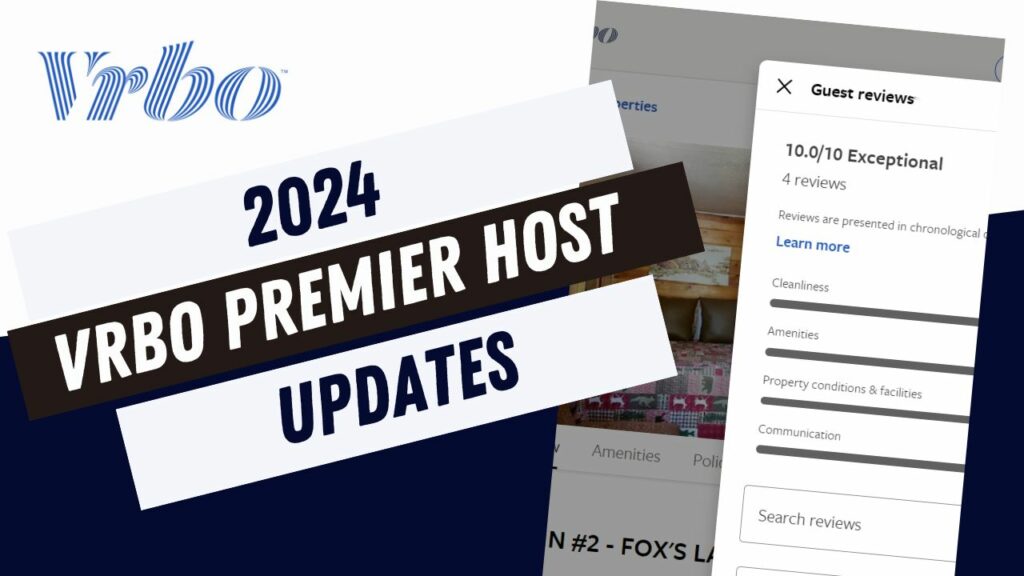Attention Vacation Rental Managers listing on VRBO: Are you up to speed with the changes to VRBO’s Premier Host partner program in 2024?
This year has brought about significant updates, including the discontinuation of the Boost visibility program and the implementation of stricter eligibility criteria for achieving Premier Host status. These changes mark a pivotal shift in how VRBO recognizes and rewards excellence among its hosts. We’re delving into the reasons behind the discontinuation of Boost—a program that aimed to gamify visibility but ended up being too complex and not sufficiently aligned with VRBO’s objectives. Initially, VRBO’s Premier Host program mirrored Airbnb’s SuperHost program closely. However, as Airbnb evolves, introducing new, listing-specific badges like Guest Favorite and Top 1% Listings Worldwide, the competition for quality is intensifying.
What do these developments mean for VRBO’s recognition programs, and how will they impact you as a vacation rental manager? Let’s explore the evolving landscape of host recognition and what it signifies for your strategy on VRBO.

The 2024 Vrbo Premier Host Program: Key Changes
In 2024, the Premier Host program on VRBO introduces significant changes aimed at enhancing the quality and reliability of hosts on the platform. These changes reflect VRBO’s commitment to ensuring great traveler experiences by recognizing and rewarding hosts who consistently go above and beyond in delivering excellent service. Here’s an overview of what’s new for Premier Hosts in 2024:
Discontinuation of the Boost Program:
One of the most notable changes is the discontinuation of the Boost Program. Previously, Premier Hosts could use Boost points to improve their listings’ search position for select days. This gamification element aimed at increasing visibility and bookings is no longer available, shifting the focus towards intrinsic quality and performance metrics to drive visibility.
We detail below in the sections what the Boost program was and why we think Vrbo discontinued it.
Stricter Eligibility Criteria:
The criteria for achieving Premier Host status have become more stringent, ensuring that only the most dedicated and high-performing hosts are recognized. The updated requirements are as follows, based on a rolling 12-month period effective January 1, 2024:
- 95% or higher booking acceptance rate.
- Under 1% owner-initiated cancellation rate.
- 4.4 or higher average review rating.
- A minimum of 5 bookings or 60 booked nights.
- At least 3 reviews from travelers.
These criteria underscore VRBO’s focus on reliability, guest satisfaction, and operational excellence among its hosts.
Enhanced Benefits for Premier Hosts:
Despite the discontinuation of the Boost Program, Premier Hosts continue to enjoy exclusive benefits designed to highlight their commitment to quality and guest satisfaction. These benefits include:
- A Premier Host badge displayed on all of their property pages, including new listings, signaling to travelers the host’s proven track record of providing excellent stays.
- An automatic increase in search position, enhancing the visibility of their listings without the need for manual Boost points application.
- Inclusion in the Premier Host filter, making it easier for travelers to find and book with Premier Hosts.
- Priority support with 24/7 access, ensuring Premier Hosts receive the assistance they need promptly.

Comparison of VRBO and Airbnb Host Recognition Programs
The evolution of host recognition programs in the vacation rental industry reflects a dynamic approach to rewarding excellence. Initially, VRBO’s Premier Host program relaunched in April 2021 and Airbnb’s SuperHost program shared similarities in their approach to recognizing host excellence on an account level. Over time, these programs have undergone significant changes, with Airbnb recently introducing new strategies that significantly shift the competitive landscape.
Initial Similarities
Account-Level Recognition: Both Airbnb’s SuperHost and VRBO’s Premier Host programs initially focused on recognizing the overall excellence of hosts across their entire account. This approach rewarded hosts for consistently providing outstanding service across all their properties.
Evolving Criteria
Stricter Standards: Over the years, both platforms have tightened their criteria for recognition, ensuring that only the most dedicated and high-performing hosts receive acknowledgment.
Airbnb’s Strategic Shift
Introduction of Guest Favorites and Specific Mentions: Airbnb has introduced the Guest Favorite badge along with specific mentions for top-performing listings (top 1% and top 25% listing worldwide). This marks a shift towards increasing competition for quality on a per-listing basis, rather than evaluating the host’s overall performance.
Implications for VRBO’s Premier Host Program
Broad Acknowledgment vs. Individual Listing Recognition: VRBO’s Premier Host program continues to evaluate hosts based on their performance across all listings, offering a broad acknowledgment of a host’s commitment to quality. This contrasts with Airbnb’s move towards recognizing individual listings for their unique quality and guest experience.
Advantages for New Properties:
Under VRBO’s system, new properties introduced by Premier Hosts automatically benefit from the Premier Host badge, highlighting the host’s overall reliability and quality from the outset, even without individual listing reviews. This is why you can have listings with Vrbo Premier Host but no reviews.
Airbnb’s Increased Competition for Quality
- Focus on Listing-Specific Excellence: Airbnb’s new recognitions, like the Guest Favorite badge, focus on distinguishing listings that exhibit exceptional quality, pushing hosts to strive for excellence in each property’s guest experience.
- Challenges for Property Managers: This shift poses challenges for property managers with multiple properties, as new listings no longer inherit the broader SuperHost advantages but must earn their recognition based on individual performance.
What did Vrbo initially add the Boost program to its Premier Host perks?
The Boost Program was essentially designed as a tool for hosts to proactively manage and enhance the visibility of their listings, encouraging active participation and strategic decision-making to maximize bookings and revenue on the VRBO platform.
Improve Listing Visibility:
At its core, Boost was designed to help Premier Hosts improve their listings’ search position for selected dates. This increased visibility aimed to make properties more discoverable to travelers, enhancing the chances of securing bookings.
Drive Bookings During Varying Demand Periods:
The program allowed hosts to strategically use “power-ups” to enhance visibility and attract bookings during both peak periods and slower seasons. This flexibility helped hosts fill gaps in their calendars and optimize their revenue throughout the year.
Reward and Encourage Host Engagement:
By earning power-ups through bookings and completed stays, hosts were incentivized to maintain high service levels and stay actively engaged with the VRBO platform. This engagement was intended to foster a virtuous cycle where quality service led to more bookings, which in turn could be leveraged for even greater visibility.
Gamify the Hosting Experience:
Boost introduced a gamified element to managing listings, making the process of optimizing search positions more interactive. This approach aimed to engage hosts in a novel way, encouraging them to participate actively in the promotion of their listings.
Offer Strategic Flexibility:
The program provided hosts with the ability to choose specific dates to boost, allowing for strategic planning around their listings’ visibility. This flexibility enabled hosts to target their promotional efforts towards times when they most needed to increase bookings.
Enhance Market Competitiveness:
By allowing hosts to improve their search rankings, Boost aimed to give Premier Hosts a competitive edge in the VRBO marketplace. This was especially valuable in crowded or highly competitive regions, where standing out in search results could significantly impact booking rates.
Boost and Power-Ups: A complex gamification exercise
Complexity Example: Managing Power-Ups
- Earning Power-Ups: Hosts earn power-ups through two main actions: receiving a booking and after guests complete their stay. The mechanism for earning involves a fractional allocation where, upon booking, hosts earn 20% of their potential power-ups, with the remaining 80% awarded after guest checkout. This system requires hosts to track not only bookings and completions but also the fractional earnings of power-ups over time.
- Applying Power-Ups: Once earned, hosts must decide how to strategically apply these power-ups to enhance their listing’s visibility. This involves selecting specific dates to boost, determining the number of power-ups to use for optimal effect, and predicting the potential impact on search position. The decision-making process is further complicated by the need to anticipate booking patterns, competitor activity, and seasonal demand fluctuations.
- Expiration and Specificity: Power-ups expire one year from the date they’re earned, adding a layer of temporal strategy to their use. Additionally, power-ups are listing-specific and cannot be transferred between properties, requiring hosts with multiple listings to manage each property’s power-ups independently.
Why did Vrbo discontinue the Boost program?
The discontinuation of the Boost program suggests a strategic decision by VRBO to simplify the host experience, reduce complexity, and rely more on data-driven approaches to listing promotion. By focusing on algorithmic enhancements and removing the need for hosts to navigate the intricacies of a gamified system, VRBO aims to create a more user-friendly platform that rewards high-quality listings and host engagement more directly and transparently.
Low Awareness and Utilization:
Despite the potential benefits of Boost, there was a significant issue with low awareness among hosts. Many were either unaware of the program or did not fully understand how to effectively accumulate and use their power-ups. This lack of engagement meant that the program’s benefits were not fully realized across the platform.
Complexity and Gamification Challenges:
While the Boost program sought to gamify the process of improving listing visibility, the rules and mechanics proved too complicated for many users. Effective gamification should encourage participation through clear, achievable actions and rewards. However, the complexity of the Boost program may have deterred hosts from engaging with it as intended, reducing its effectiveness as a tool for driving host behavior and listing promotion.
Unclear Impact on Host Behavior:
One of the underlying goals of gamification is to influence user behavior in a way that aligns with the platform’s objectives, such as encouraging hosts to provide more availability or preferentially list on VRBO. The Boost program’s impact on such behaviors appears to have been unclear, suggesting it may not have effectively incentivized hosts to align their actions with VRBO’s goals.
Algorithmic Optimization Preference:
Over time, VRBO may have recognized that allowing an algorithm to determine which properties are highlighted could be a more efficient and equitable approach. Algorithms can assess a broad range of performance metrics and feedback to automatically promote high-quality listings. This shift towards algorithmic optimization reduces the need for hosts to manage promotional tools like Boost, streamlining the process of gaining visibility and potentially leading to a more meritocratic system of listing promotion.







